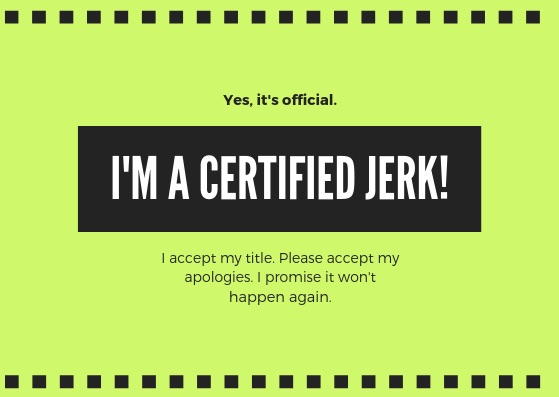“What I want to say is that I’m sorry. There’s no excuse for yelling at you. I know I embarrassed you in front of the others. I will understand if you are angry with me. I hope you can forgive me. What can I do to fix this?”
This statement contains the most critical elements of an apology:
- Expressing your regret.
- Owning your behavior and saying what you did.

- Acknowledging the damage created by your words or deeds.
- Recognizing the other person’s feelings.
- Asking for a chance to make amends.
To make a meaningful apology, we need to work our way through three separate stages.
- Preparing yourself and your words.
- Offering the apology.
- Making amends through your future behavior.
Preparing
Before you can apologize in a meaningful way, it’s helpful to sit down and reflect on your actions and what you want to say. Sometimes, before you can find your words, you need to look at why you don’t want to apologize.
For some people, apologizing feels threatening.
- You don’t want to appear weak.
- You worry that you’ll get in trouble if you admit you did something wrong.
- You can’t separate your actions from your self-image. In other words, you know your behavior was mean. But if you admit it, you worry that you are revealing that you are a mean person, when in truth you are probably a regular nice guy or gal who just screwed up.
- You are afraid that an apology would open the gates to conflict.
- You’re uncomfortable feeling vulnerable.
My experience working with teenagers in a restorative justice program for juveniles taught me a lot about the importance of preparing before you make an apology:
Many years ago, I was a mediator in a victim-offender program for juvenile offenders, where, as part of their sentence, teens (and often younger children) had to make amends to the people they had victimized. The amends included an apology and an offer to compensate the person for their losses, for example, damage to a car, broken windows in a home or business, or property loss due to theft. One of my responsibilities was to prepare the teen for the conversation with the persons they had harmed so they could make a genuine apology. Helping the teens work through their discomfort with apologizing and helping them find the right words for their apology was an inspiring experience.
The process I worked through with my teenage clients will help you, too. These are things to consider:
- Take an honest look at your behavior. What did you do that actually caused harm?
- What harm did you cause? Step into the other person’s shoes and vicariously live through the experience to understand both the emotional as well as the material losses they experienced. Is it possible you caused someone to feel hurt, fear, anger, self-doubt, and even self-blame?
- Pay attention if you drift into blaming the other person. You can’t get to a real apology if you blame someone else for your actions. Blaming the victim is all too common. So you might as well go through all your excuses in the preparation stage. Get it out of your system before you offer your apology.
- I’m sorry I yelled at you, but you provoked me.
- I didn’t mean to take the lawnmower without asking, but it was just sitting there, and you weren’t using it.
- If only you had locked your desk, I wouldn’t have rummaged through it.
- Listen to the excuses you’re making to let yourself off the hook. For example, you may want to say, I was (tired, hungry, already worried about something at work, etc.) so I lost my temper with you. Words like these don’t measure up. On the other hand, it is okay to explain yourself and still take responsibility if you phrase it this way: I was really tired when I yelled at you, but it was still wrong of me to lash out at you.
Offering the Apology

Your apology needs to include the five elements introduced in the opening quote. You’ve considered what you want to say and now:
- You express your regret or sadness for your words or behavior.
- You take responsibility—own—that you caused pain to another person. You acknowledge the consequences of your words or actions. For example, I was thoughtless when I called your boyfriend a jerk. Or, I was mean to gossip about you to our boss, and I regret my behavior.
- You are willing to set things right, so you ask, What can I do to make this up to you?
- You promise not to repeat the offensive behavior.
- You ask for forgiveness directly: “Please forgive me.”
Making Amends Through Action
Making amends is an action that repairs or undoes the damage that was done. It is a way of making the other person whole again. Each situation requires a response that is relevant and addresses the specific needs of the person who was hurt.
When we damage property, we can repair or replace it, as part of our apology. When the damage we have done is emotional or psychological, we may need to ask a difficult question: What can I do to make it right for you? Sometimes that can mean making a public apology, especially if you shamed or embarrassed someone in front of other people. Sometimes it can be a gesture of understanding and goodwill. For example, if a manager in an organization utters or repeats sexist or racist comments, he or she might voluntarily enroll in a sensitivity training to show their remorse and intention not to repeat the behavior.
Apologizing does not give you a pass to behave badly in the future. An important but overlooked part of apologizing is not to repeat the offensive behavior. Genuine apology means changing your behavior.
Final Thoughts
The power of apology can heal immediate relationship rifts that have the potential to grow into resentments. While not always comfortable, it is less stressful in the long run to say, I made a mistake just now and I’m sorry, than to procrastinate having a difficult conversation.
While the power of apology can set relationships right, it also helps you directly. A heartfelt apology helps you feel better. You can release what happened and not have to replay things in your mind. Apology frees you from having to sit with feelings and thoughts of guilt or self-righteousness that distract you from being fully present in your life. Apologizing has long-term benefits, as well, by expanding mindfulness about your behavior: while apologizing can be a humbling experience, you can learn to recognize the signals that you are going to say something without thinking. You will detect more quickly if your words might be harsh or offensive, and then change what you were going to say.
Finally, keep in mind that although an apology can benefit us directly, we apologize to acknowledge the other person’s hurt. Remember that people need time to process a painful encounter. They may not be ready to talk with you for several days or even weeks. Be patient and don’t expect anything back. All the same, keep in mind that both small and large gestures of apology have tremendous potential to heal each person involved, including you.
Do you need help speaking up with authority AND grace? I can help you ~
- Manage your interpersonal conflicts with less stress and more confidence
- Deal with difficult people
- Speak up for yourself in all your relationships
- Ask for what you want and get it
Contact me to set up a complimentary session.
505 501 8157
https://smartcookiecoach.com/contact/








